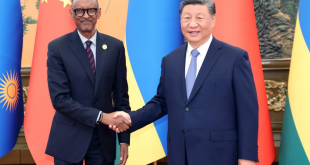By Staff writer

The growing partnership between China and Africa has contributed significant developments in the context of industrialization. Over the past few decades, China has emerged as a key player in the economic and infrastructural development of Africa, helping to accelerate the continent’s industrialization. This collaboration is multifaceted, involving trade, investment, technology transfer, infrastructure development, and capacity building.
China’s involvement in Africa can be traced back to the early 2000s, but it intensified after 2006 with the establishment of the Forum on China-Africa Cooperation (FOCAC). This platform has since served as a critical avenue for expanding economic ties, especially in industrial and infrastructural sectors. As Africa’s need for industrialization has become more pressing, China has positioned itself as a strategic partner in addressing these needs.
The Need for Industrialization in Africa
Industrialization is vital for Africa’s economic growth and development. Currently, most African economies remain heavily dependent on raw materials and agriculture. While these sectors are crucial, they are often subject to price volatility in international markets, which leaves the continent vulnerable to economic instability. Industrialization presents an opportunity to diversify economies, create jobs, enhance technological capabilities, and improve overall living standards.
Despite Africa’s vast natural resources and growing population, it has been lagging in terms of industrial output. According to the United Nations Industrial Development Organization (UNIDO), Africa accounts for only 2.5% of global manufacturing output. This stark statistic highlights the continent’s reliance on external sources for goods and services that are crucial to modern economies. The lack of infrastructure, technical know-how, and capital has exacerbated this situation, making industrialization a difficult goal to achieve independently.
China’s Role in Africa’s Industrialization
China’s rise as a global economic power has provided Africa with new opportunities for industrialization. With its own experience in transforming from a predominantly agrarian society into a manufacturing powerhouse, China has offered valuable expertise and resources to African countries seeking to replicate its success.
Trade and Investment
China’s investment in Africa has been substantial, particularly in sectors critical to industrialization. In 2023, China still remains Africa’s largest trading partner, with trade volume reaching a record $282.1 billion and projected to reach $300 billion by 2035. The focus has been on industries such as mining, energy, telecommunications, and manufacturing. Chinese companies have invested in African factories, enabling the production of a wide range of products, from textiles to electronics, thus contributing to the growth of the industrial base.
Additionally, China has been a major source of financing for large-scale infrastructure projects, which are essential for industrialization. These projects include the construction of railways, highways, ports, and energy plants, all of which enhance Africa’s capacity to support industrial production. Through initiatives like the Belt and Road Initiative (BRI), China has helped to improve connectivity across the continent, reducing the cost of doing business and fostering regional integration.
Technology Transfer and Skills Development
One of the most significant aspects of China’s partnership with Africa is the transfer of technology and skills. Chinese companies often bring advanced manufacturing technologies to Africa, helping to build local capabilities in sectors such as textiles, steel production, and electronics. Moreover, China has established numerous industrial parks across the continent, where African workers receive hands-on training in modern manufacturing techniques.
This technology transfer extends beyond the physical infrastructure to include digital technologies, which have become increasingly important in today’s global economy. As Africa continues to embrace digital transformation, Chinese companies are playing a key role in helping African nations improve their technological capabilities and create a more competitive industrial base.
Challenges and Considerations
While the partnership between China and Africa holds great promise, it is not without its challenges. Critics argue that China’s involvement in Africa sometimes leads to a form of neo-colonialism, where African nations become overly dependent on Chinese capital and expertise. Additionally, some worry that Chinese companies might prioritize their own interests over those of the host countries, particularly when it comes to labor practices and environmental sustainability.
However, the potential for mutual benefit remains strong if the relationship is managed carefully. African governments must ensure that they extract the maximum benefit from their partnerships with China by focusing on the development of local industries, fostering entrepreneurship, and ensuring that Chinese investments lead to sustainable and inclusive growth.
China and Africa’s collaboration has the potential to transform the continent’s industrial landscape. As Africa seeks to diversify its economies and reduce its dependence on raw material exports, China’s expertise, investment, and infrastructure development offer a pathway toward achieving sustainable industrialization. The key to the success of this partnership lies in mutual cooperation, where both sides can learn from each other, overcome challenges, and work together to build a prosperous and industrialized Africa.
 Africa -China Review Africa -China Cooperation and Transformation
Africa -China Review Africa -China Cooperation and Transformation
